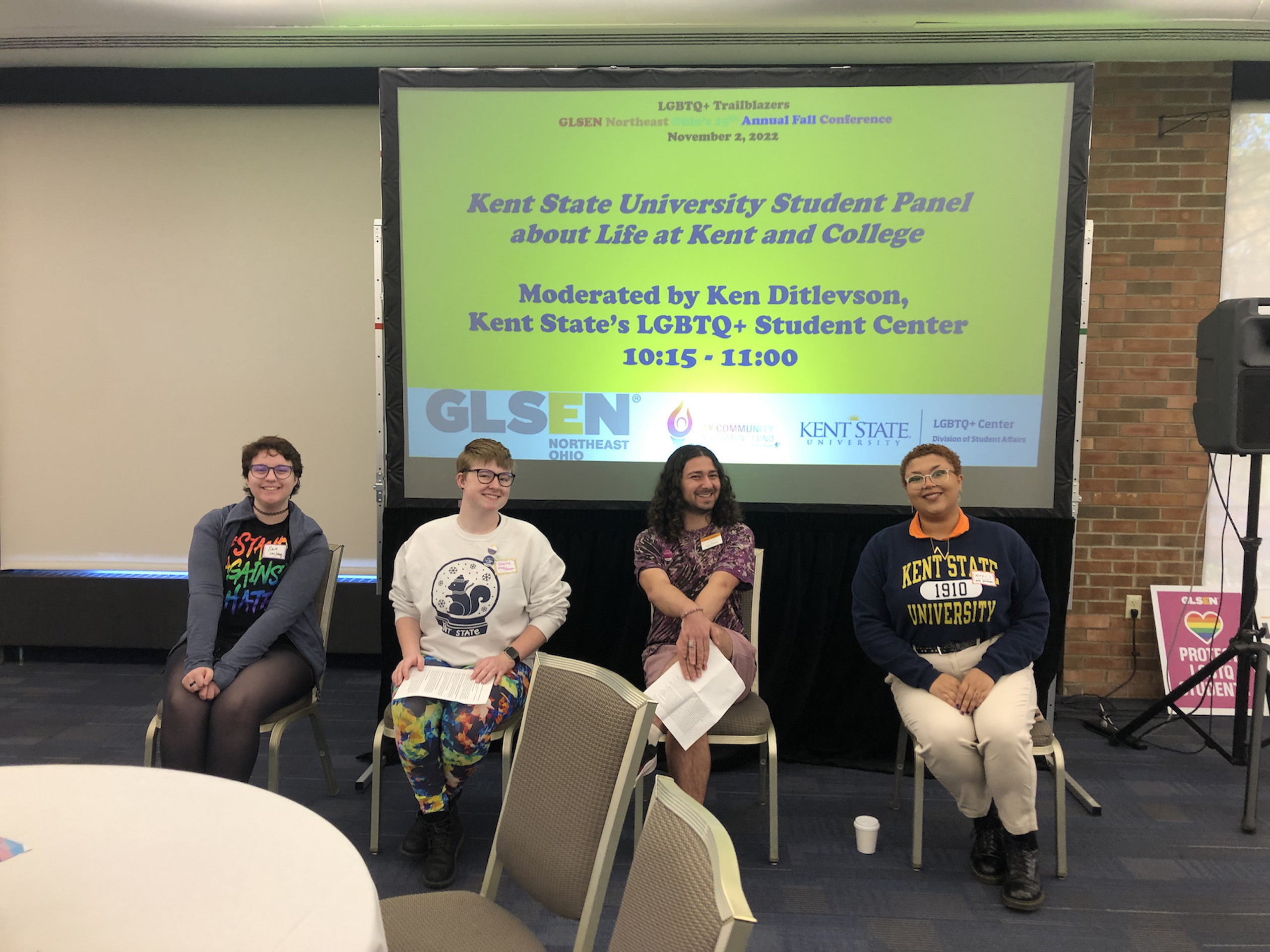On November 2, students and faculty from 20 area high schools came to Kent State for Gay Lesbian Straight Education Networks (GLSEN) Northeast Ohio’s 15th Annual Fall Conference. It’s the seventh consecutive time that Kent State has hosted the conference.
This year’s theme was “LGBTQ+ Trailblazers” and sessions during the day focused on issues of leadership and change. Specifically, how individuals and groups can advocate change for themselves, school systems and universities.
Throughout the day, groups talked about the trailblazers. “These are people who helped pave the way and empower our students to become the next trailblazers,” said Ken Ditlevson, director of Kent State’s LGBTQ+ Center.

Guests and Panel Discussions
One of the speakers was a trailblazer here at Kent State. In 1971, Jeff Bixby,’74, was one of the founders of the Kent Gay Liberation Front (KGLF) as one of the first gay student organizations in the country. Now named PRIDE!Kent, it is the longest continuously operating LGBTQ student organization in the country. Bixby continued as an activist after he graduated from Kent State. He spoke about being a leader and trying to make change for equality.
There was also a panel discussion led by Kent State students who are interns in the LGBTQ+ Center. They shared their perspectives about what their college experience has been like as members of the LGBTQ community and offered tips and suggestions for college-bound students. The panel talked about what students should look for in a supportive university, what resources have been most helpful for them and the programs, events, and mentorship programs they have been active in.
Ditlevson said, “You know, just to learn from here – it’s one thing to hear from 50-year-old Ken, but then to hear from people that are closer to their age, right now, in their walks of life as a student at Kent. For them to be able to share those experiences was really valuable for the students that were in attendance.”
Charlie Simecek, a senior psychology major with a minor in LGBTQ studies is an intern in Kent State’s LGBTQ+ Center and was one of the leaders of the panel discussion. “I really wished I would have been able to go to a panel like this when I was in high school, so I'm so glad I could be on the panel for this conference,” said Simecek. “I really hope I made an impact on the students in the room and made them feel less scared about coming to college because in my experience college has been a much more positive experience than high school.”

Also serving on the panel was Gabe Mulé, a senior psychology major with a music minor, who is also an intern in the LGBTQ+ Center. "I loved being on the GLSEN Panel, as nervous as I was to speak and make a positive impact, I knew the prospective college students also shared anxieties about college and being LGBTQ+. College can be overwhelming, so I really hope all of our tips and insights landed for those who need the reassurance and inside look," said Mulé.
The high school GSA groups
Attendees arrive on school busses and were made up of high school students and faculty who are members of the LGBTQ+ community as well as allies. They were all members of the GSA organizations in their high schools and middle schools. “GSA” can stand for “Gay/Straight Alliance “or “Gender and Sexuality Alliance,” depending on how the group was founded.
Students in attendance had to receive parental approval to attend the conference, and the agenda was listed within the topics.
Within these groups, not all of the members necessarily identify within the LGBTQ community. “I would say that a large majority of the students that came do identify within the community, and some are “out,” and some are not,” said Ditlevson. “Some of the students that are in their GSA organizations, they just believe in equality and want to work towards that, too. And they want to be supportive and make it clear what they stand for.”
Hope and encouragement
Ditlevson said that he wished that supportive events like this had existed when he was in high school, struggling with feelings of hopelessness and seeing “no light at the end of the tunnel.” “I think events like this really do make a difference,” said Ditlevson. “I know that they would have made a difference to me, encouraging me to stick it out and work toward getting to college.”
“To be able to give students some of that hope and some of the tips on how to get there and how to navigate unsupportive families and things like that – I think it is really encouraging and gives a lot of students hope.”

